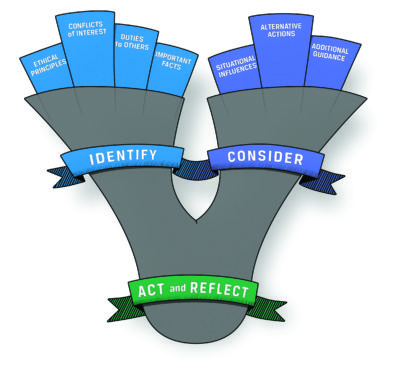Ethics in Practice: Designation Is Like a Degree, Right? Case for Week of 26 February
Analysis available below. Check it out!
Earning the CFA designation from CFA Institute is hard work and has been compared to earning an MBA. But there are some differences in using the designation. Read on to learn more and see whether you understand the nuances of what CFA Institute expects from those that are CFA charterholders.
Case
Bilal Ahmed recently earned his CFA designation and joined a medium-sized hedge fund as a senior analyst. His supervisor, Elizabeth Bennett, the founder of the firm, earned her CFA designation 10 years ago. But she has not paid her CFA Institute membership dues for the past four years and no longer participates in the organization’s continuing education program. Bennett uses the CFA designation on her business card and on all the marketing materials for the fund. When Ahmed asks Bennett about her using the designation, Bennett tells him that since she passed the exam and earned the charter, the credential is similar to a degree from university that cannot be taken away. Later, during a marketing pitch by Ahmed and Bennett to a potential investor, the investor notes that he has narrowed down his manager search to firms that only employ CFA charterholders in senior positions. He asks Bennett if everyone in the firm on the investment side is a CFA charterholder. Bennett responds “Yes, that is correct.” Ahmed does not respond. Did either Ahmed or Bennett violate the CFA Institute Standards of Professional Conduct? Join the conversation to let us know your answer and why you chose it.
- Ahmed violated the CFA Institute Standards of Professional Conduct.
- Ahmed did not violate the CFA Institute Standards of Professional Conduct.
- Bennett violated the CFA Institute Standards of Professional Conduct.
- Bennett did not violate the CFA Institute Standards of Professional Conduct.
Analysis
This case relates to CFA Institute Standard VII(B): Reference to CFA Institute, the CFA Designation, and the CFA Program, which states that when referring to the CFA designation, CFA Institute members and candidates “must not misrepresent … holding the designation.” The CFA designation is unlike a degree from university in that once granted the right to use the designation, individuals must also satisfy CFA Institute membership requirements (including paying dues) to maintain the right to refer to themselves as CFA charterholders. Although Bennett earned her charter, her membership is considered lapsed because she has not been paying dues to CFA Institute. Until her membership is reactivated, she must not present herself as a charterholder, and by continuing to use the CFA designation and representing herself as a charterholder to a potential client, Bennett has violated Standard VII(B).
Participation in the CFA Institute Continuing Education Program is not mandatory for maintaining your designation, but it is encouraged as a way to meet the CFA Institute Code of Ethics provision that calls for members to maintain and improve their professional competence. Ahmed hears Bennett refer to herself as a charterholder, but knows that Bennett’s CFA Institute membership has lapsed. Standard I(A): Knowledge of the Law prohibits members from knowingly participating or assisting in the violations of others and requires members to dissociate from any unethical or illegal conduct. The issue for Ahmed is whether his acquiescence and silence in the face of Bennett’s misrepresentation rises to the level of assisting or participating in Bennet’s violation of the standard.
It could be argued that Ahmed’s participation in a sales meeting in which he knows false information is given to a potential investor, and which could cause harm to that investor, constitutes assisting in the violations of those who provide that false information even if there is no active conduct by Ahmed. Best practice would be for Ahmed to address Bennett directly about her conduct and ask her to reinstate her membership or correct the statement made to the potential investor. If Bennett refuses to take corrective action, Ahmed could bring this conduct to the attention of the fund’s compliance department for them to address and dissociate from the activity by not participating in any additional sales meetings with Bennett.
This case was written by Tanuj Khosla, CFA, CAIA
Have an idea for a case for us to feature? Send it to us at [email protected].
More About the Ethics in Practice Series
Just as you need to practice to become proficient at playing a musical instrument, public speaking, or playing a sport, practicing assessing and analyzing situations and making ethical decisions develops your ethical decision-making skills. To promote “ethical exercise,” we are excited to introduce Ethics in Practice.
Each week, we post a short vignette, drawn from real-world circumstances, regulatory cases, and CFA Institute Professional Conduct investigations, along with possible responses/actions. We then encourage you to assess the case through the lens of the Ethical Decision-Making Framework and the CFA Institute Code of Ethics and Standards of Professional Conduct and let us know which of the choices you believe is the right thing to do and why. If you are not a CFA Institute member, you can post your choice and reasoning in the comments section below. For CFA Institute members, we would like you to join the conversation in our Member App and post your responses there. Later in the week, we will post an analysis of the case and you can see how your response compares.
Image Credit: ©CFA Institute


Bennett can’t use the CFA designation given that she hasn’t paid membership dues.
Do you also share the answers?
CFA Professor
We will post the analysis of this case later in the week.
Hi ,
Please advise what is the right answer considered for this case?
Thank you
Please revisit the post to read the analysis that has been posted. Here is a link if you need it: http://cfa.is/2FPueAs.